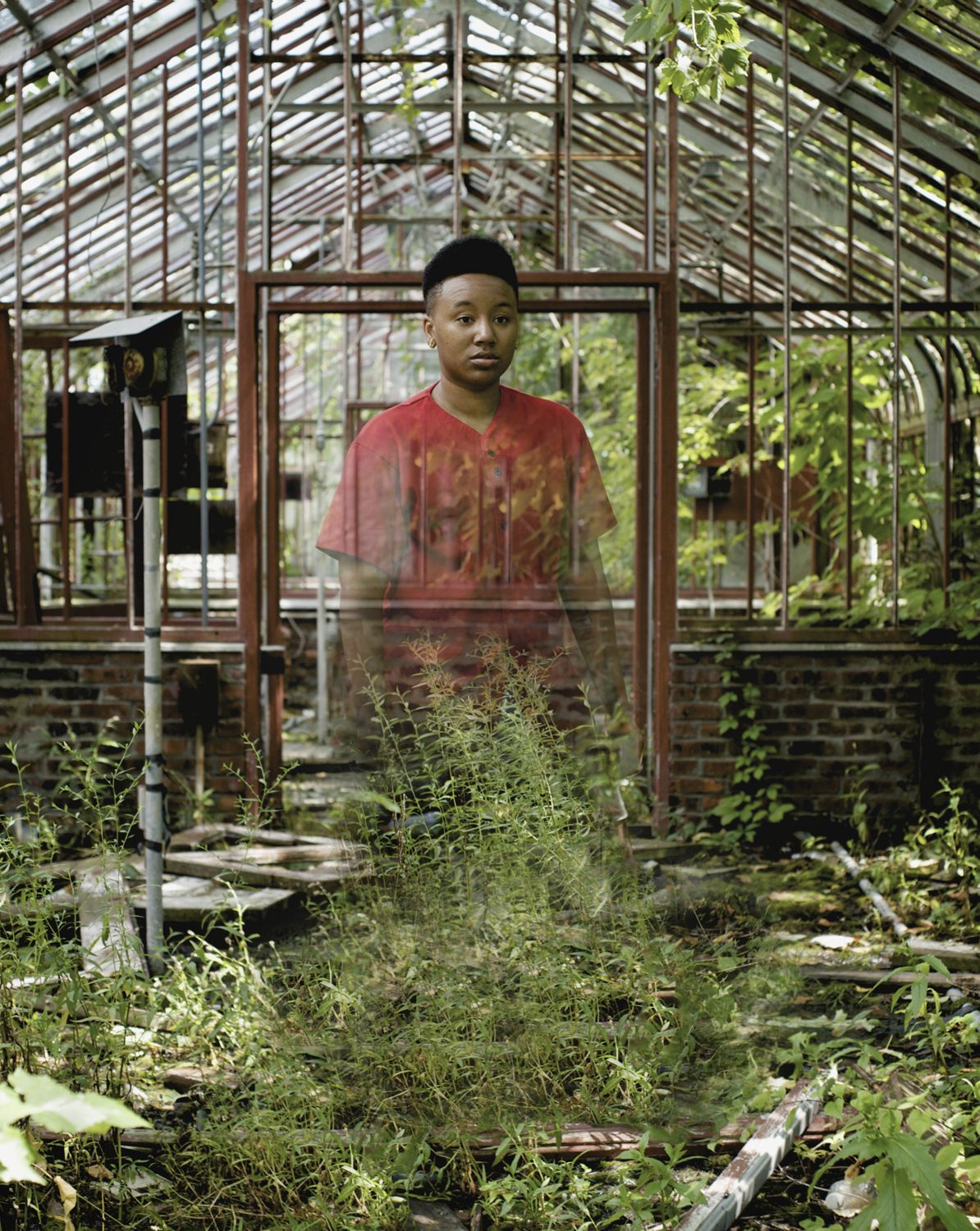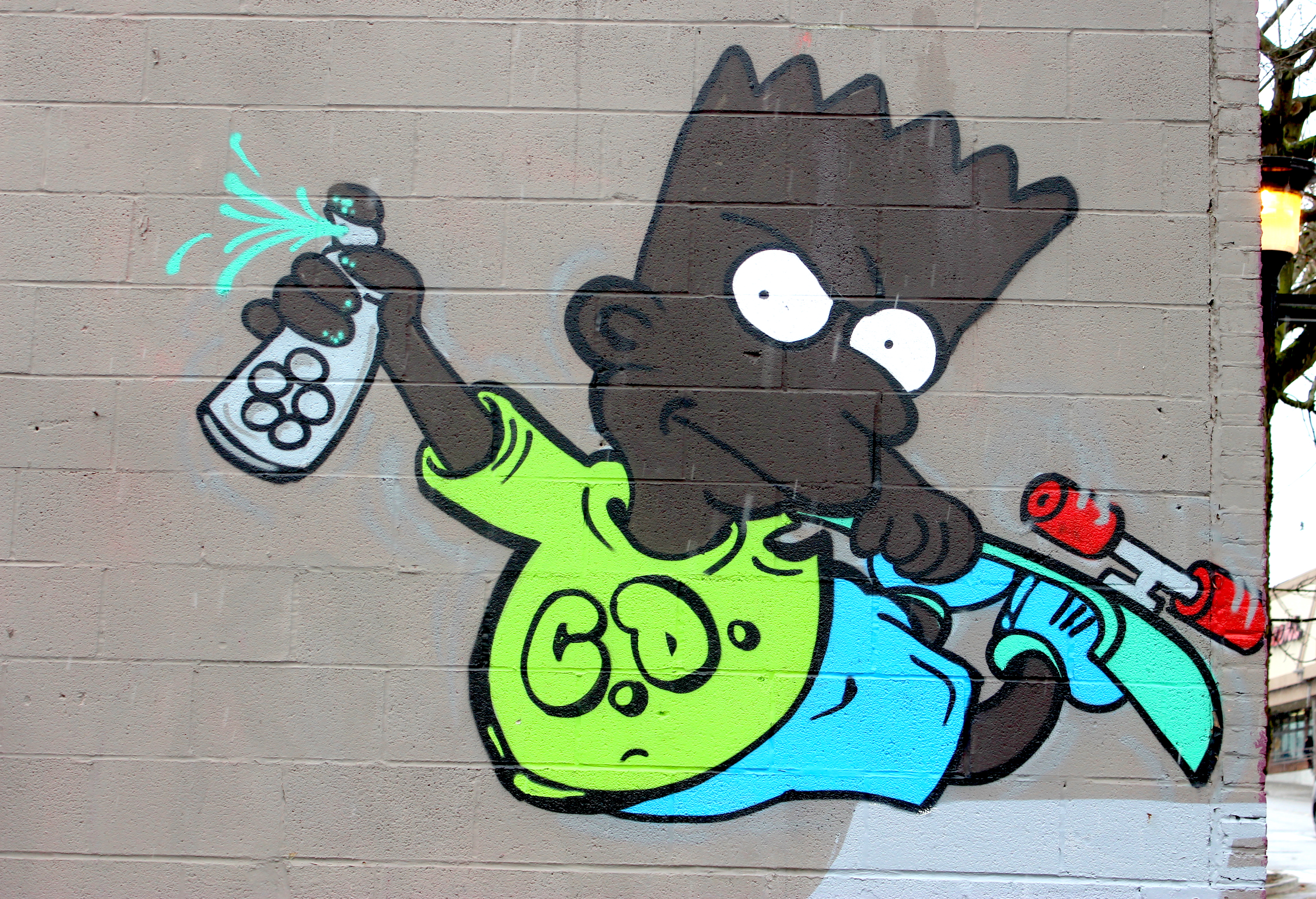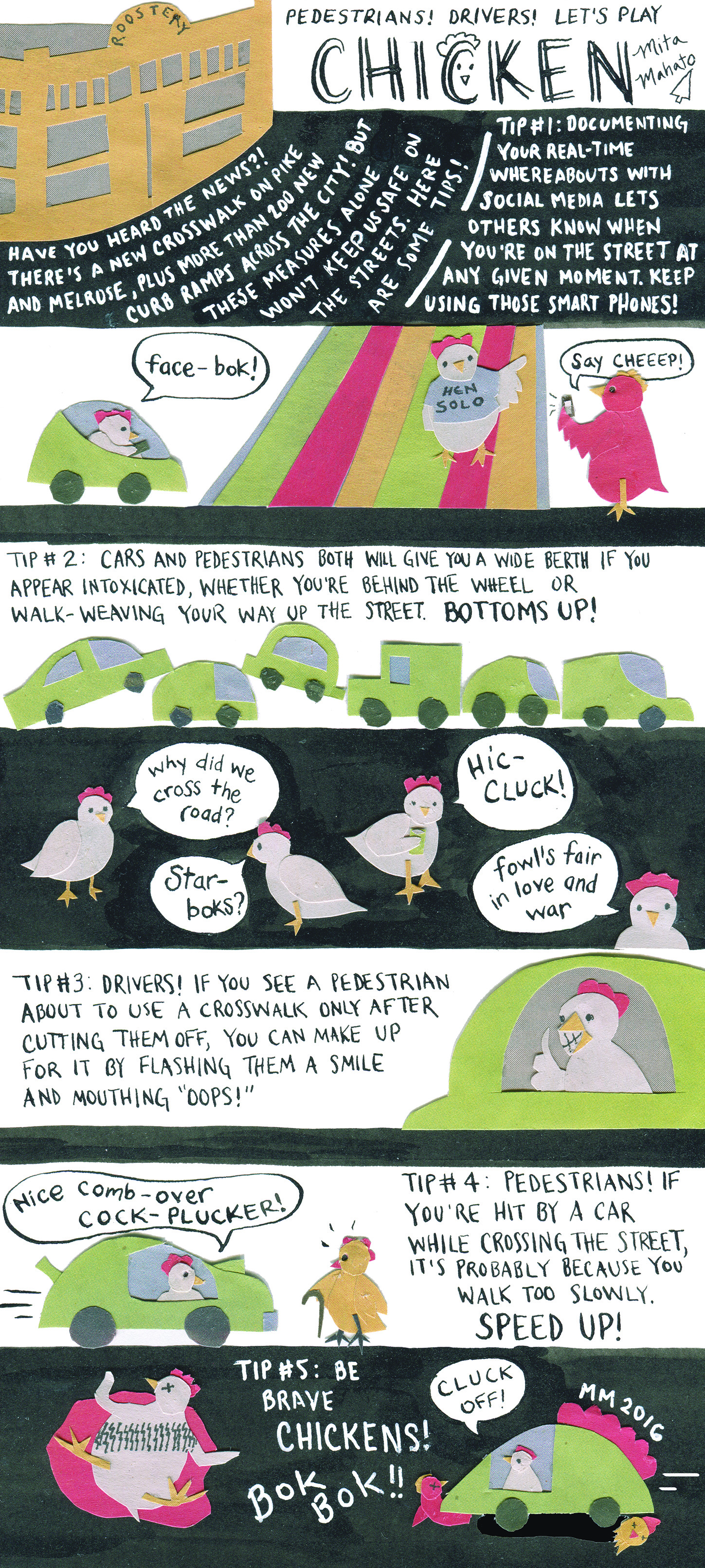At first, the four members of La Luz were afraid to tell anyone about their decision to pack up and leave town. “I felt like we’d gotten so much support from the people in Seattle,” Shana Cleveland says, “especially after the accident; people really showed us how much they loved us here.” The band’s lead guitarist and vocalist is referring to the night in 2013 when a semitruck spun out on a patch of black ice and smashed into the band’s tour van. Fans responded by filling La Luz’s PayPal account with donations, and local artists directed proceeds from their own shows to help recoup the equipment the band lost in the near-fatal collision.
For a moment, the band members contemplated not telling people they were moving at all. “But after a while it was like, ‘You know what, guys, that would be really rude if we just left and didn’t tell anyone,’ ” Cleveland says, laughing. So drummer Marian Li Pino crafted a letter to La Luz’s fans, which the band edited together and then posted to Facebook on December 22. “Beloved Seattleites,” it began, “In early 2016, we will be moving to sunny Los Angeles.” La Luz’s two back-to-back New Year’s Eve shows at Neumos, the last on a long U.S. and European tour, would also be their last as Seattleites. (Cue the inevitable L.A. Luz jokes).
“It’s a trip to be home—even though I know it’s not about to be home,” Cleveland would later tell the rapturous crowd at the first of the band’s final two nights, “but we are really excited to see all you guys here.”
“Why?” a remorseful young fan next to me woefully asked her face-painted friend. “Why do they have to leave?”
In the past couple of years, as a noticeable chunk of Seattle’s music community has shipped out, the dominant narrative in town, as countless messages scrawled in the streets and news headlines remind us every day, is one of impending doom for those trying to make a living making art. “Seattle Is Too Expensive for Artists Who Help It Boom,” declared the latest, a KUOW story from a few weeks ago. Fans wondering why their favorite bands are leaving town find a ready culprit in such stories: gentrification and overdevelopment.
Yet more often than not, money isn’t the force driving artists out of Seattle.
Take Stasia Irons. In 2013, the rapper from Sub Pop’s cosmic R&B/hip-hop group THEESatisfaction decided to move to Brooklyn. One reason was to follow a relationship, but she was also just bored. “I felt like we’d played every venue here,” she says. “I feel like some people reach the point that they just become a ‘Seattle artist’ or a ‘Pacific Northwest artist’—an artist who goes to Portland or something, maybe does a Seattle/Portland/Canada tour, but that’s as far as you’ll reach. And I didn’t want that at all for us. I definitely didn’t want to stay here my whole life and do Neumos every year or something like that.”
Although New York was overwhelming and too fast-paced at first for her self-described chill West Coast style, the city totally delivered on her hopes. After Irons got to know local clubs, THEESatisfaction was able to score East Coast gigs much more easily, and the duo had to buy only one plane ticket to make those shows happen. On top of that, Irons, who says she’s interested in getting into the music side of the film industry, immediately fell in with some pretty high-level talent.
“I started kicking it with the Broad City girls,” Irons says. “Wyatt Cenac and Hannibal Buress, just people like that. I was able to connect with a lot of people who I never would have been able to if I’d stayed in Seattle. That was definitely a part of it, and then also, Seattle being an extremely non-diverse place to live.”
Diversity is also an issue for La Luz’s Cleveland, who says one reason she’s looking forward to L.A.—beyond the extra sun-triggered vitamin D—is the city’s more widely representative scene. “I think for a lot of us, one thing that’s exciting about the rock-and-roll scene there is that it feels more racially diverse—it doesn’t feel like it’s all white people,” Cleveland says. “I do feel like diversity makes for a more interesting scene.”
Cleveland is also looking forward to L.A.’s faster, more challenging pace. She left Chicago 10 years ago for Seattle, a city she says she never intended to stay in as long as she has, and now she says she’s feeling uninspired.
“I feel like it’s a really comfortable place to be as an artist, but I don’t think comfort is something that feeds creativity,” she says.
But for some artists who leave, Seattle’s artistic culture and diversity is what inspires them and keeps them wanting to come back.
“Growing up in Seattle . . . I was exposed to a lot of different families, the music they listened to, the language they spoke,” says Sango, a local hip-hop producer known for his tonally unique Afro-Brazilian-gone-trap style. “I found myself sampling music from Eritrea, which kind of happened randomly at the time, but I knew it and I understood it, just having grown up around friends from Eritrea and hearing the music—Somalian too.”
Last year, Sango returned to Grand Rapids, Mich., to become a better musician. Looking to hone his already impressive skills as a beatmaker, he sought the counsel of his close friends in the seven-member hip-hop collective AGO, which he’d first joined when he attended Grand Rapids’ East Kentwood High School. “They really helped me be a better producer—an artist rather than just a producer who makes beats,” he says.
Seattle-bred ambient electronic artist and vocalist Shaprece Renee recently made a similar musical pilgrimage, relocating to L.A., where she’s hoping to learn more about the business end of being an artist and to find a proper home for her upcoming LP Coals. She wrote and recorded the album in Seattle and spent last summer mixing it in L.A., where she started meeting people in the industry. A few days after performing the album live with the Seattle Symphony at Benaroya Hall, she decided to move to L.A. provisionally for a year.
“It’s a bit more rapid in L.A.; it’s kind of like, you never know who you’re sitting next to,” she says. “Most of these music agencies are based in L.A., even though my creative process is very rooted in Seattle. Everything that I write about, all my inspiration comes from nature, and that’s something that’s not very present in L.A. But I worked on the album for two years, and I’m not the only person who worked really hard on it, so I just want it to come out with the best plan possible because I owe that to the people who have been a part of it.”
Shaprece says despite needing to be “a tumbleweed at this point” to further her artistic career, Washington is still where she intends to settle—citing the laid-back atmosphere and lush, abundant hiking routes off I-90 as key influences on her creative process.
Atmospheric producer Nathan Levenson of Seattle’s secondnature collective, who performs under the moniker Josef Gaard, also cites the Northwest’s landscape and prevailing vibe as a key influences on his distinct fog-shrouded take on dub techno. It’s a literal influence—Levenson employs sounds on his album that he recorded in nature while living in the forest and working on farms. It’s one thing Levenson says he’ll miss most about Seattle when he moves in one month, a decision he says was heartbreaking. After relationship issues and the sudden loss of his job, Levenson has decided to try his luck in the global center for forward-thinking electronic music: Berlin.
It’s hard to argue about the drastic infrastructural differences between Seattle and Berlin as far as techno goes. Leading electronic-music media outlet Resident Advisor holds an office in the German city; one of the most internationally renowned cutting-edge electronic record stores in the world, Hard Wax, is located there; and countless dance labels call the city home. Levenson says a friend almost immediately landed a distribution job at celebrated experimental dance label Pan when he moved to Berlin recently. Levenson hopes he can pull off a similar feat, and also hopes the move will help nourish the record label he’s looking to start.
As excited as he is, he’s also sad to leave home. “I felt like we [the secondnature collective] were building something special, and I’m leaving it for a place where there’s so much that’s already established,” Levenson says. “You can get more recognition for doing something in a place where something isn’t happening, which is definitely how we got recognition with secondnature—it was something special because no one else was really doing it. I didn’t really want to leave Seattle, but I felt like I had to for my own personal growth. I love Seattle . . . the music scene is really tightknit, it’s not the kind of music community you can find most places.”
Even Kate Becker, director of the Seattle Office of Film + Music, admits Seattle is no Berlin, L.A., or New York. But she recognizes other values that have helped the Seattle scene thrive through boom and bust. “There’s probably more publicists and managers per capita in other cities, but I really think Seattle’s music scene has some real merits to it,” she says. “Our scene is much more collaborative and there are so many unique opportunities here.”
Indeed, Cleveland of La Luz says she might not have started taking music as seriously as she did if K Record’s founder Calvin Johnson hadn’t randomly been at one of her first shows at the Central District’s Hollow Earth Radio, whose founders, Garrett Kelly and Amber Kai Morgan, were two of the first friends she made when she initially moved to Seattle 10 years ago. (For more on Hollow Earth Radio, see “Dialed In,” page 10.) On the strength of her performance, Johnson would later release some of Cleveland’s earliest records on K.
“Seattle is such an amazing place for a band to get started because there’s such a strong community and infrastructure here to support bands,” Cleveland says. “The city’s definitely changing, and that’s kind of a bummer to me, but everywhere we’ve traveled, even in Europe, every city seems to be having that same issue. Everyone’s like, ‘Oh, it used to be so much cooler here.’ ”
Cody Blanchard, guitarist of popular Oakland doo-wop punk group Shannon and the Clams, says he was indeed feeling that way about the Bay Area before he recently packed up and moved here. “The first five years I was there, there were tons of good crazy bands doing wild stuff,” he says. “I feel like now when we’re playing the Bay, in San Francisco, we play with the same two or three bands over and over because there are so few interesting bands there.”
Part of that, Blanchard says, can certainly be blamed on San Francisco’s housing crisis, which Seattle frequently cites as the worst-case scenario for its own upward-trending rents.
“I was looking at the prices for housing here and in Oakland, but on average Oakland was $500 more for similar spaces and neighborhoods than for Seattle,” Blanchard says. “In San Francisco, it was probably $500-$1,000 more on average. The cheaper places are getting farther and farther out from the center or where things are happening. It didn’t take me very long to find something in Seattle, though; I was here within two weeks. I found a place on Capitol Hill—I love being able to walk everywhere.”
Beyond its being cheaper, Blanchard says he was attracted to Seattle by the friends he’d made, having played here frequently for Shannon and the Clams’ enthusiastic local audience. (The band is signed to Sub Pop offshoot label Hardly Art.) He says he’d already made 20 to 40 friends in Seattle before moving here. “There’s so much access to whatever weird shit you want here,” he says. “Weird shit, weird culture, there’s a lot at your fingertips.”
These aspects of Seattle life are not always lost on those who leave. Sometimes they return.
Sango came back after just half a year in Grand Rapids. “The people here are willing to look harder at and appreciate your work more because everybody is trying to make their own noise,” he says. “In Grand Rapids, it’s just like, ‘Oh, wow . . . you’re doing music! That’s tight . . . keep it up.’ ”
THEESatisfaction’s Stasia Irons recently returned from New York for family business, but says she’s enjoying home for the time being, especially because “It’s a lot cheaper here.”
Still, for many it’s not cheap enough. And though a soon-to-be-published 2016 goal
report from the Office of Film and Music will focus very heavily on preserving affordable space for musicians, practice, venues, and music businesses, the dominant narrative remains dominant for a reason.
Take the story of Nils Petersen, member of Ole Tinder and Hotel Vignette and former guitarist for the once-rising, now-defunct Sub Pop psych-rock band Rose Windows. “Coming back from tour, it was so depressing knowing I had nowhere to live,” he says. When Rose Windows first got signed to Sub Pop in 2013, Petersen suddenly found himself on big national tours lasting up to 10 weeks. He couldn’t justify continuing to rent his cheap, scrappy Seattle dwelling while he was away for so long. When he returned, every rental he could find was way out of his price range. A friend from Tacoma defaulting on a home mortgage let Petersen squat with him for free for seven months before Petersen happened upon a place of his own 26 miles north in Everett. At the same time, Rose Windows found itself strapped for the cash needed to rent a practice space in Seattle.
“Nobody had money to put into an extra space outside of where they were living,” Petersen says, “so we just kind of bounced around to wherever we could.” Living rooms, lofts, friends’ studios—whoever had enough space to cram in seven band members and was willing to host a night of practice is where they went.
Everett, as Petersen describes it, actually had its perks. “It’s odd—when I moved to Everett, I almost felt more support there than I did Seattle,” he says. “Maybe that was just a small-town mentality, but it’s something I never really felt strongly about in Seattle.” Rose Windows did well in Everett thanks to the zealous Everett Music Initiative, a program successfully attempting to jump-start a music scene in the outlying city. Through the support of EMI, Petersen also scored a gig as the house sound guy at the new Everett venue The Cannery.
But as fate would have it, Petersen just moved back to Seattle. He could no longer justify the bus commute into the city, where he works as a teacher to 32 private music students and where his other band, Ole Tinder, still practices.
“When I looked online, it was like, ‘Can’t afford that, can’t afford that,’ ” he says. But when a spot opened at a friend’s house in Seattle, he jumped on it. But how could he afford it? “It’s an unheard-of deal,” he says. “It’s a really cheap house . . . that’s going to be torn down. We’re probably in the last seven months of this house before it gets demolished and turned into condos. I know that once this place goes out, I’m going to be out of the city again.” E
ksears@seattleweekly.com
















